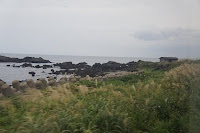After Sunriver, Bill and I proceeded to Longview, Washington for his motorcycle drivers’ test, taking the scenic byway along the Columbia River in Oregon. We drove through the Hood River County Fruit Loop, not the cereal, but the roads that circle farms, orchards, wineries and vineyards (now with 45 members). Apples, pears, peaches, cherries, and oranges were all imported in the Philippines and it was a joy to touch them hanging right in their branches. We brought a pear as huge as a basketball to the Andersons with whom we were staying for the night; together with the Mackies (both part of the DUs)!
Then we went to the Bonneville Dam which also has a big fish hatchery for salmon and steelhead in the Northwest. There I met Herman, a 9-ft. Sturgeon who has a big following. Buttons, t-shirts, caps and all kinds of souvenir items were on sale for those he mesmerized, including moi! The fish ladders were also a very instructive part of the tour of the dam that powers the Northwest.
Next we visited The Grotto, a beautiful 62-acre Catholic shrine and botanical garden located in Portland, Oregon. The heart of the shrine is Our Lady’s Grotto, a rock cave carved into the base of a 110-foot cliff. A life-size marble replica of Michelangelo’s Pieta is featured in its center. On The Grotto’s upper level, we discovered its manicured gardens, religious artwork, and panoramic views of the Columbia River Valley, the Cascades and Mt. St. Helens. There we sat in silence at the awe-inspiring Meditation Chapel overlooking the city. Curiously, we also found a Filipino Shrine, the Dambana.


Finally, we reached Longview, we parked at Walmart, and Bill took his test. Sadly, he skidded in one routine and did not make it, along with four others (out of 5) who took the test that day). I guess he did not have enough time to practice. Unfortunately, he could not take a retest until a week later so we had to think fast. We decided to go to the coast, cross the Columbia and visit Fort Clatsop in Oregon, then cross the Columbia again to spend a few days in Long Beach, Washington before heading back to Longview.

Fort Clatsop, at the southern mouth of the Columbia River, is the climax of the westward journey of Lewis and Clark. It was in Nov. 15-24, 1805 when they set up Station Camp. On January 8, 1806, they wrote about a 105-ft long whale that beached and died in the sands and from which they obtained 300 pounds of blubber! The Fort is pretty, with re-creations of how they must have set up camp but none of the original structures still stands. The replica that stands there now was completed in 1955.

All along the river, you can still see the original log poles used for much of the log industry that developed after the Lewis and Clark expedition. They are 80-yr. old Douglas fir of about 60 feet in length with 20 ft. embedded into the water. They were used for log sorting and raft making. It is also interesting to take note of the bridges crossing the Columbia, especially the one called the
Bridge to Nowhere because, at an angle, the bridge actually seemed to go nowhere!
 Long Beach
Long Beach is the longest beach in the United States (28 miles) and the world’s largest drivable beach! We were there in early October and the beach was eerily empty and the air bitingly cold. There are several exhibits along the very long boardwalk. The best is the skeleton of a 38-ft. sub-adult gray whale lying on grassy portion of the beach. In April 2003 the City of Long Beach completed the excavation and reconstruction of the bones of the whale that beached and died there in May 2000.


At a distance we also saw a huge kite flying alone, a far cry from the color and buzz on the third week of August each year when Washington’s International Kite Festival is held. A mile from the beach is the World Kite Museum, the only American Museum dedicated exclusively to the thrill, joy, art, science and world history of kites. It has outstanding kite collections, including those of kites used in warfare, and extensive archival materials, making it the definitive information source on kites internationally.


And, finally, it was time to head back to Longview. In the middle of practice drives there, Bill and I found Lake Sacajawea, a pretty man-made lake that ran through the center of town. We made the hike around the lake perimeter, about 2 miles. And beside the Library is the most unusual bridge you will ever find. It is called The Nutty Narrows Bridge. It is a bridge atop a busy road, connecting 2 trees on either side. So many squirrels died crossing that road that the community built them a bridge!
Then D-Day came. Bill took the test. And this time, he passed! Yehey! We were on to the volcanic origins of the West.
Next Stops: Crater Lake National Park, Lava Beds National Park and the Mount Lassen Volcanic National Monument






















































